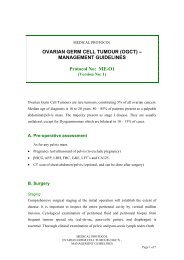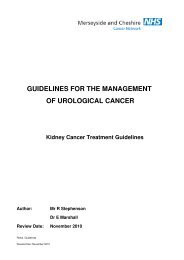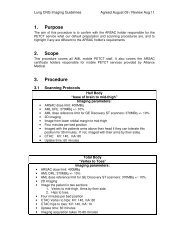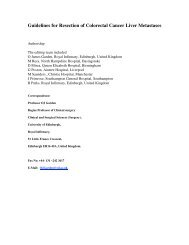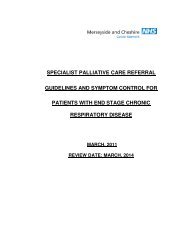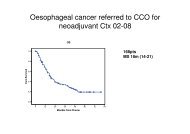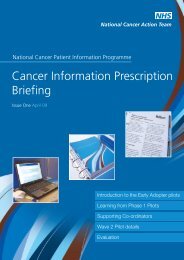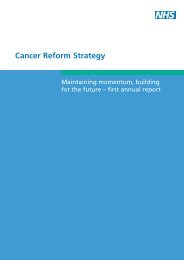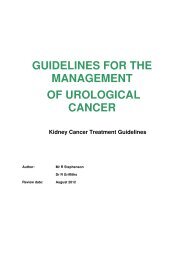Cancer Reform Strategy - NHS Cancer Screening Programmes
Cancer Reform Strategy - NHS Cancer Screening Programmes
Cancer Reform Strategy - NHS Cancer Screening Programmes
- No tags were found...
You also want an ePaper? Increase the reach of your titles
YUMPU automatically turns print PDFs into web optimized ePapers that Google loves.
112 CANCER REFORM STRATEGY9.12 <strong>Cancer</strong> networks play an essential role infostering this collaboration. PCTs in somenetworks have been very successful at bringingtogether the relevant commissioningpartnerships to plan and monitor servicedelivery. <strong>Cancer</strong> networks have been lesssuccessful where they have lacked PCTengagement, network teams largely workingwith providers in isolation of mainstream healtheconomy systems.9.13 We believe that cancer networksshould play an important part in deliveringthe actions set out in this strategy.However, now is the appropriate time toreview their role. During the developmentof this strategy the advice we have receivedand which we endorse is that:●●●Networks should respect and supportany patient who chooses to receivetreatment at National Institute forHealth and Clinical Excellence (NICE)compliant services outside the network;Network teams will need to developstronger links with leads for cancer inProfessional Executive Committees andlocality practice based commissioningarrangements;There should be sound hostingarrangements for network teams andstrong leadership from a designated PCTCEO, ensuring that networks areaccountable to commissioners as wellas with PCT contract leads; and●Networks teams should act as agents forcommissioners, supporting them tocoordinate their activities and providingshared expertise, maintaining thedialogue with clinical teams and users,agreeing clinical guidelines andpathways and driving forwardinnovative, high quality care;● Networks will typically operate at 1 1 ⁄2 –2 1 ⁄2 million population and usually coverfive or six PCTs, as this corresponds topatient flows across a care pathway;●●●For less common cancers, networksshould work with each other to developstrategies and plans working with theirspecialised commissioning groups;Networks will act as advisors to PCTs onissues such as: needs assessment anddemand profiling, prioritisation withinthe cancer agenda, service improvementand redesign, quality assurance and peerreview, pathway and providerperformance, patient experience andvalue for money;Networks should ensure contestability ofservices between providers as well asco-operative working;●Core funding for network teams and userand clinician engagement mechanismsshould be from commissioners, althoughadditional funding can also be soughtfrom other sources.9.14 Fulfilling this function will requireexperienced clinical and managerialleadership, with networks needing to drawon expertise relating to public health,finance and pharmaceuticals. Further detailabout the future role of networks will beincluded in the commissioning guide forcancer.9.15 As part of their performancemanagement role, SHAs will be expected to:●●Monitor the performance of PCTs andSCGs in relation to cancercommissioning, against the key criteriaset out in this strategy and thecommissioning guide;Ensure that effective collectivecommissioning arrangements are inplace that are integrated intomainstream health economy needsassessment, contracting andperformance systems, supported byclearly defined working arrangementsbetween commissioning partners; and



